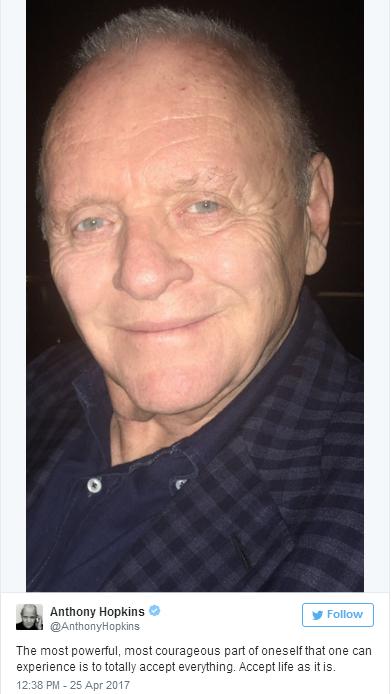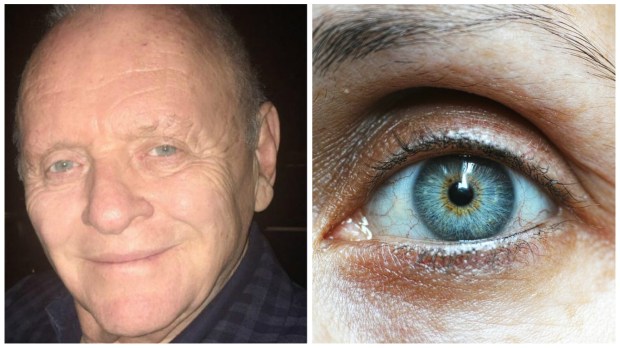Lenten Campaign 2025
This content is free of charge, as are all our articles.
Support us with a donation that is tax-deductible and enable us to continue to reach millions of readers.
Happened to be browsing through Twitter while sipping my lunch (no, not a martini, just an astonishing raw-egg shake that I’ll tell you about someday) when I happened across this tweet from Sir Anthony Hopkins, that stopped me in mid-scroll:

I like that. Of course, you must work to change those things in life that you can change, particularly if it means changing what is broken, faulty or lacking in yourself, but there are so many things in life that are truly beyond our control — headlines we don’t like; co-workers or family members we will never change; the terrors of the past — and we waste so much time and energy banging our heads against them, often (as David Mills notes) putting our souls at risk, in the process.
There are some parts of our lives that we simply have to accept, “as is” and do the best we can with those realities, with as much faith-born serenity as we may permit. I needed to think about that, today, for many reasons.
Then I read another story, of a woman coming at life from a circumstance very different from Hopkins’ but her insight, while similar was ten times more potent, given her story. You see, 50 year old Michelle Melland was a go-getter; she was an athlete, veteran, her family’s breadwinner. Now, she is a blogger of book reviews, which she writes with the only part of her body she can still move, her eyes.
Instead, inside her Brookside home, Melland lies on her back, arms straight at her sides, her head propped on a pillow on her hospital bed. The whoosh and sigh of a ventilator feeds oxygen through the tube in her trachea. She’d be unable to breathe without it. But Michelle Melland can read. The disease has no effect on her sharp mind. Using computerized eye-gaze technology that allows her to type on a tablet-like keyboard by just staring at letters, Melland also can write. And she’s been writing a lot — having read 44 books in the last 44 weeks. For each, she has written a review, typed out over hours using only her eyes and posted to a blog, bookthoughtsfrombed.com, that Melland designed and created herself. “This blog is what happens when a woman who is productive by nature gets confined to a hospital bed,” she wrote in the About section of her site, which mentions her illness. “I’m basically paralyzed and spend most of my time in bed. … Thanks to technology, I’m able to access and control online e-readers, and thanks to Amazon and local libraries, I have limitless numbers of books to choose from. I’m optimistically looking at this phase of life as ‘retirement’ and aren’t I lucky that I get to spend my retirement reading in bed?” She adds, sarcastically, “Yeah, it’s a stretch…”
I love this story because once again it reminds a world that too often believes people are disposable that no one is to be thrown away, and that it is not up to others to assign a value to anyone’s quality of life.
Melland has a doting husband and two teenage daughters, and she is doing what she can with life, “as is” in a most instructive way:
For Melland, who was raised Catholic and keeps a crucifix hanging on the wall behind her right shoulder, the illness has continuously tested her faith. Yet soon after being diagnosed, “I noticed how often the phrase ‘be not afraid’ appears in Scripture,” she said. “I’ve really taken that phrase to heart.” Although she said she never ascribed to a single or overarching “intentional life philosophy,” she said she has always, even now, tended to be positive about life and does have a guiding belief. “I always believed,” she typed, “in controlling what you can — your education, your job performance, the quality of your relationships, your attitude, etc. — and coming to terms with things you can’t control, like a totally random terminal illness. “I couldn’t change the fact that I had ALS,” she continued, “but I could control how I reacted to that reality.”
Read her whole story, which is brave, humbling and very lovely. You’ll feel inspired to do better at discerning what part of life needs to taken “as is” and lived with as much construction as your fiat will allow.
When the Holy Spirit puts two such compelling voices, striking such a similar message in quick succession, I tend to sit up and pay attention.
Especially when it all seems to tie in so well with this lesson of exile from Fr. Robert McTeigue: “Success in this life is not found in succeeding in this life, but in getting out of this life successfully…”

